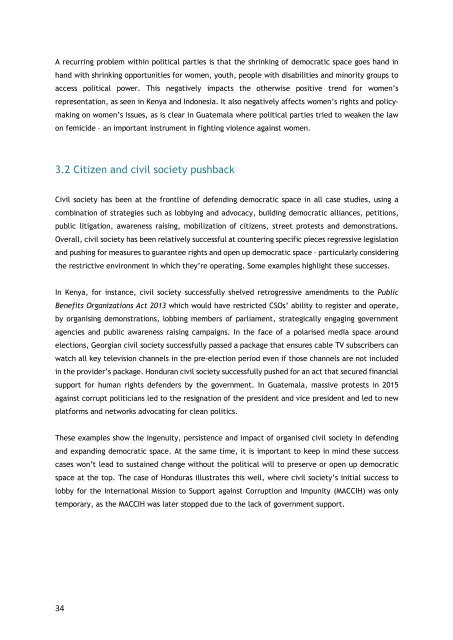Thinking Democratically: A Comprehensive Approach to Countering and Preventing Shrinking Space
Create successful ePaper yourself
Turn your PDF publications into a flip-book with our unique Google optimized e-Paper software.
A recurring problem within political parties is that the shrinking of democratic space goes h<strong>and</strong> in<br />
h<strong>and</strong> with shrinking opportunities for women, youth, people with disabilities <strong>and</strong> minority groups <strong>to</strong><br />
access political power. This negatively impacts the otherwise positive trend for women’s<br />
representation, as seen in Kenya <strong>and</strong> Indonesia. It also negatively affects women’s rights <strong>and</strong> policymaking<br />
on women’s issues, as is clear in Guatemala where political parties tried <strong>to</strong> weaken the law<br />
on femicide – an important instrument in fighting violence against women.<br />
3.2 Citizen <strong>and</strong> civil society pushback<br />
Civil society has been at the frontline of defending democratic space in all case studies, using a<br />
combination of strategies such as lobbying <strong>and</strong> advocacy, building democratic alliances, petitions,<br />
public litigation, awareness raising, mobilization of citizens, street protests <strong>and</strong> demonstrations.<br />
Overall, civil society has been relatively successful at countering specific pieces regressive legislation<br />
<strong>and</strong> pushing for measures <strong>to</strong> guarantee rights <strong>and</strong> open up democratic space – particularly considering<br />
the restrictive environment in which they’re operating. Some examples highlight these successes.<br />
In Kenya, for instance, civil society successfully shelved retrogressive amendments <strong>to</strong> the Public<br />
Benefits Organizations Act 2013 which would have restricted CSOs’ ability <strong>to</strong> register <strong>and</strong> operate,<br />
by organising demonstrations, lobbing members of parliament, strategically engaging government<br />
agencies <strong>and</strong> public awareness raising campaigns. In the face of a polarised media space around<br />
elections, Georgian civil society successfully passed a package that ensures cable TV subscribers can<br />
watch all key television channels in the pre-election period even if those channels are not included<br />
in the provider’s package. Honduran civil society successfully pushed for an act that secured financial<br />
support for human rights defenders by the government. In Guatemala, massive protests in 2015<br />
against corrupt politicians led <strong>to</strong> the resignation of the president <strong>and</strong> vice president <strong>and</strong> led <strong>to</strong> new<br />
platforms <strong>and</strong> networks advocating for clean politics.<br />
These examples show the ingenuity, persistence <strong>and</strong> impact of organised civil society in defending<br />
<strong>and</strong> exp<strong>and</strong>ing democratic space. At the same time, it is important <strong>to</strong> keep in mind these success<br />
cases won’t lead <strong>to</strong> sustained change without the political will <strong>to</strong> preserve or open up democratic<br />
space at the <strong>to</strong>p. The case of Honduras illustrates this well, where civil society’s initial success <strong>to</strong><br />
lobby for the International Mission <strong>to</strong> Support against Corruption <strong>and</strong> Impunity (MACCIH) was only<br />
temporary, as the MACCIH was later s<strong>to</strong>pped due <strong>to</strong> the lack of government support.<br />
34

















